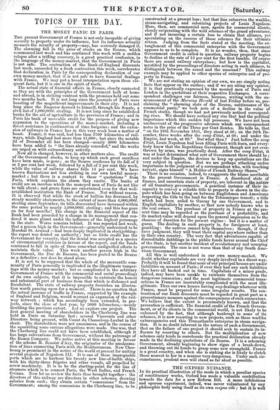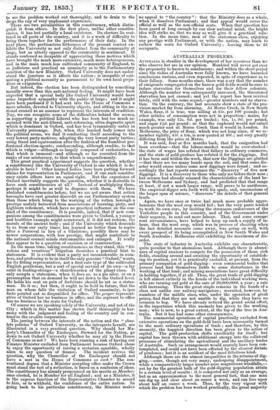THE OXFORD NUISANCE.
La its practical illustration of the mode in which a peculiar species of constituency works, Oxford has made a valuable contribution towards the data for a new Reform Bill. A more infelicitous and operose experiment, indeed, was never volunteered by any philosophic body using itself as its own corpus vile ; but it is well
to see the problem worked out thoroughly, and to drain to the dregs the cup of very unpleasant experience.
There are two peculiarities in this constituency, which distin- guish it from others. In the first place, unlike other constitu- encies, it has but partially a local existence. Its electors lie scat- tered in all parts of the country, and it is a work of difficulty to bring them together for the performance of their duty. In the next place, the pertinacious bitterness of the present contest ex- hibits the University as not only distinct from the community at large, but as utterly opposed to the community in sentiment. It stands confessed as incapable of appreciating those motives which have brought the much more extensive, much more heterogeneous, and in the main much less cultivated community of England, to so judicious and practical an unanimity as to the Parliamentary sanction of the new Ministry. Oxford University does not under- stand the juncture as it affects the nation ; is incapable of esti- mating a political necessity as paramount to its own local preju- dices or exigencies.
But indeed, the election has been distinguished by something morally worse than this anti-national feeling. It might have been expected that a special body like Oxford University would have some imperfect sympathy with the public at large ; and it might have been pardoned if it had sent into the House of Commons a mere scholar, devoted to University objects, and sitting in the na- tional council as an assessor to represent the interests of erudition. Nay, we can recognize some of the difficulties behind the scenes, in supporting a political Liberal who has been but too much as- sociated with the anti-liberal, anti-reforming, ultra-dogmatic spirit which is dominant in Oxford, and has been tyrannically unfair in University patronage. But, when this learned body comes into the political arena, we find it conducting itself according to the very lowest party motives; adopting the very lowest 'party tactics; using fraud and equivocation after the fashionof the humblest pro- fessional election-agents; condescending, although erudite, to that which is vulgar—although so largely composed of ecclesiastics, to that which is immoral—and although so far recruited from the ranks of our aristocracy, to that which is ungentlemanly. This great practical experiment suggests the question, whether a constituency like the University of Oxford is one which it is de- sirable to have ? Other learned bodies have been putting forward Claims for representation in Parliament, and if one such constitu- ency exists others have an equal right. But the experience of Oxford inevitably suggests the question, whether it is desirable to have such constituencies at all ? Instead of multiplying them, perhaps it might be as well to dispense with them. We have abolished constituencies before, but we are not aware that rotten boroughs have cast greater discredit on our Parliamentary system than those which bring to the working of the rotten borough a prestige unduly borrowed from associations of learning, piety, and highborn refiement, which have no practical influence on the con- duet of the constituency. It is possible, indeed, that if new com- panions among the constituencies were given to Oxford, a younger and healthier example might counteract, if it did not redeem, the morals of the ancient body ; and if the University which descends to us from our early times has learned no better than to aspire after a Perceval in lieu of a Gladstone, possibly, there may be newer corporations with less prestige that might contribute to the national council minds statesmanlike and enlarged. It really does appear to be a question of excision or of counteraction.
In the mean time, taking constituencies as they stand, this "fri- volous and vexatious" litigation furnishes a practical hint to statesmen. It is evident that a party not inconsiderable in num- bers, and professing to be in itself the only genuine" Oxford," wants, for its fitting representative' not a first-rate type of the cultivated English gentleman, but a sort of special servant of its own—a lay saint in leading-strings—a churchwarden of the pliant class. It only accepts a statesman, when it does so, as a pis idler, or on a presumption that on demand he will act down to the Oxford level. He holds his seat on pain of forfeiture should he act as a states- man. Be it so ; but then, it ought to be held in future, that the man on whom falls the visitation of Oxford unanimity, is ipso facto pointed out as disqualified for office. The proper represent- ative of Oxford has no business in office, and the aspirant to office has no business in the seats for Oxford.
Of course we are speaking solely of the University, and not of the City ; which in this matter has shown itself thoroughly in har- mony with the judgment and feeling of the country and in con- trast to the erudite corporation.
The jarring between the interests of the nation and the "obso- lete policies of Oxford University, as she interprets herself, are illustrated in a very practical question. Why should her Ma- jesty's Chancellor of the Exchequer, Steward for the Nation, go down to ask Oxford University whether he may sit in the House of Commons or not ? We have been running a risk of having our Finance Minister excluded from Parliament because Oxford chose to enjoy the opportunity of raising a sectarian squabble, wholly alien to any question of finance. The incident revives the question, why the Chancellor of the Exchequer should not have a seat in the House of Commons as such ? The con- ventional dogma that a Minister accepting office under the Crown must stand the test of a reiflection, is based on a confusion of ideas. The constituency has already pronounced on his merits as Member: once elected, he is Member for all England ; and as a Minister, it is the express function of the Representative Chamber to accord to him, or to withhold, the confidence of the entire nation. In going back to his particular constituency, the Minister makes
no appeal to "the country " : that the Ministry does as a whole, when it dissolves Parliament; and that appeal would cover the official as well as the non-official seats. When that question has been gazed at long enough by our slow national mind, the bright idea will strike us, that we may as well give it a practical solu- tion. In the mean time, men of the statesman class, enjoying any prestige with Parliament, or with the nation, may learn to eschew the seats for Oxford University ; leaving them to fit occupants.



































 Previous page
Previous page